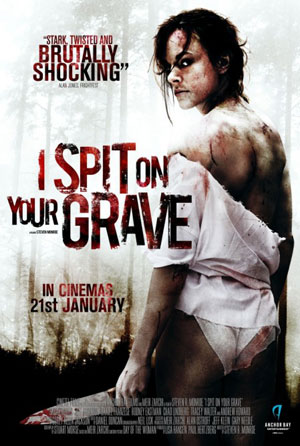I Spit On Your Grave – 3*
 It would be very easy to dismiss Steven R. Monroe’s 2010 remake of one of the most controversial thrillers of all time, I Spit on Your Grave, as a tasteless and unimaginative money-spinner by those who have not yet seen it – or the original, for that matter. Hearsay is a powerful publicity tool, and this new film needs no further introduction to prick curiosity. But you still have to ask who would pay to see a film exploiting a female through rape and physical torture – except a select torture porn minority. Has Monroe’s film take the issues of the original and given the rest of us something else to think about?
It would be very easy to dismiss Steven R. Monroe’s 2010 remake of one of the most controversial thrillers of all time, I Spit on Your Grave, as a tasteless and unimaginative money-spinner by those who have not yet seen it – or the original, for that matter. Hearsay is a powerful publicity tool, and this new film needs no further introduction to prick curiosity. But you still have to ask who would pay to see a film exploiting a female through rape and physical torture – except a select torture porn minority. Has Monroe’s film take the issues of the original and given the rest of us something else to think about?
Pert-bottomed posters aside, having seen both this film and the original Meir Zarchi one with its soft-focus, voyeuristic cinematography, and highly disturbing and claustrophobic attack setting, Monroe could be argued to have made better use of the original title, Day Of The Woman, than his predecessor. His protagonist and lone victim/survivour in question, Jennifer Hills, has a Predator-style determination that goes to partially rebalance any distress caused by seeing her degraded – and that’s coming from a female perspective. The 2010 film is as raw as Zarchi’s but far more inventive in its revenge aspect, boasting superior production values, too, with a pseudo-documentary quality as the attacks are captured on tape. This is one of its core strengths that set it apart from the titillating original and its unsettling soft-porn treatment.
Jennifer is a young and attractive writer from New York who decides to stay at a country retreat to work on her next novel. Stopping off for petrol, she draws the attention of some local men who later repeatedly humiliate and gang rape her, with the local sheriff as the ringleader. She then systematically hunts down each one of them to reap her revenge.
Newcomer Sarah Butler plays Jennifer this time, marking a courageous career step for such a young actress. That said it’s a no brainer, really, considering the hype that surrounds the film. In a warped sense, it’s a great platform for Butler to launch a budding film career because she injects intelligence mixed with anger into the role, whilst having the opportunity to show a softer, more vulnerable side at the beginning. We are allowed to actually grow to like and respect her, unlike the original Jennifer portrayed by Camille Keaton, where little character development was given.
Nevertheless, the character of Jennifer – like the plot – still seems a little simplistic and clichéd, even though Butler makes the role her own, offering more personality traits to make her more compelling. Butler is also more convincing as Jennifer, more realistic than the catwalk-like curves and seductive demeanour from Keaton. Monroe has cast well, with Butler being fragile and prepubescent in appearance. As rape is a tool of power, Butler’s portrayal and stature seems to provoke more empathy for her during her brutal ordeal, which positions us firmly behind her when she begins hunting down her prey, like a cold and calculating killer. There is even a hint that she is supernatural upon her return from ‘the dead’, and an intriguing self-reflective end shot, where Butler confronts us, the viewer, to dare to pass judgment. Monroe’s film certainly has more attitude.
Like Deliverance and other such films, Monroe plays on the ‘town verses countryside’ debate. His attackers are still a bunch of one-dimensional, one-brain-celled hillbillies that seem to have nothing better to do with their time than hunting, drinking and leering. Not much has changed in that respect; expect they are contemporary in appearance. There is no attempt to create a background story on each, allowing our imaginations to think the worst and to firmly position them as monsters.
But it is Andrew Howard as Sheriff Storch with a face like a constipated pug dog who sends chills up and down the spine, and steals the group scenes. We do get to see a bit of his family life and learn that he has a young daughter. This makes him all the more frightening, unpredictable and most depraved of the lot. He actually feels the most real of all the male characters; the others are caricatures as seen in the original, which is a shame. Still, too much detail on each would detract from the film’s purpose of female revenge, as all the sympathy must be with Jennifer, if the film is to work.
And 2010’s I Spit On Your Grave does for its bold direction. Films don’t necessarily have to entertain, but they can challenge our comfort zones. I Spit On Your Grave is one that toys with your emotions in an exploitative and unforgiving manner, but wants you to be the judge and jury, and the documentary-style cinematography helps inject more realism and seriousness into events, elevating this film above the semi-erotic original. It will still shock, appall and divide opinion, and kick off knee-jerk reactions from a new generation of filmgoers. But Jennifer just got meaner and nastier; it’s almost ‘Girl Power’ of a different persuasion, and her spree may well result in a hung jury, rather than, as the poster quote states, “but no jury in America would ever convict her!”
3/5 stars
By @FilmGazer